|
As the siege of Vicksburg began, Confederate efforts in Louisiana to
relieve the beleaguered city heated up, but ultimately to no avail.
Major General John Walker's Texas Division had been sent to stop the
Yankees from marching down to cross at Bruinsburg. But mismanagement by
Trans-Mississippi commander Edmund Kirby Smith kept the Texans from
getting the job done. Finally Walker did begin operating across the
Mississippi from Vicksburg, attacking Milliken's Bend and Young's Point
on June 7. At Milliken's Bend Walker had to withdraw after some savage
fighting with black troops in Louisiana and Mississippi regiments. The
attack on Young's Point was even more dismal for the Confederates. The
last major Confederate effort west of the Mississippi on behalf of
Vicksburg resulted in a disastrous defeat at Helena, Arkansas, on the
ironic date of July 4.
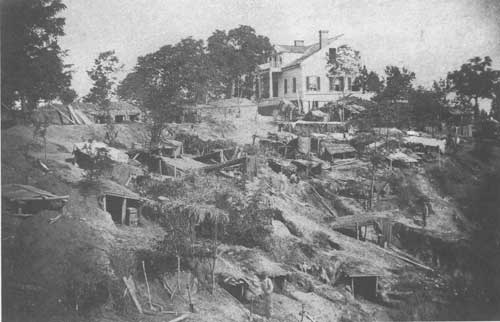
|
BOMBPROOFS IN FRONT OF THE SHIRLEY HOUSE. (OLD COURTHOUSE MUSEUM,
VICKSBURG, MISS.)
|
|
A LADY'S CAVE LIFE IN VICKSBURG
In 1864 D. Appleton and Company of New York published a Volume
entitled My Cave Life in Vicksburg, with Letters of Trial and
Travel, By a Lady. The lady was Mary Ann Loughborough, and the
account she wrote is the most thorough and vivid picture we have of cave
life in the besieged city. The following accounts are taken from her
book.
"... a Parrott shell came whirling in at the entrance, and fell in
the centre of the cave before us all, lying there smoking. Our eyes
were fastened upon it, while we expected every moment the terrific
explosion would ensue."
|
"It was about four o'clock, one Wednesday evening—the shelling
during the day had gone on about as usual—I was reading in safety,
I imagined, when the unmistakable whirring of Parrott shells told us
that the battery we so much feared had opened from the intrenchments. I
ran to the entrance to call the servants in; and immediately after they
entered, a shell struck the earth a few feet from the entrance, burying
itself without exploding. I ran to the little dressing room, and could
hear them striking around us on all sides. I crouched closely against
the wall, for I did not know at what moment one might strike within the
cave. A man came in much frightened, and asked to remain until the
danger was over. The servants stood in the little niche by the bed, and
the man took refuge in the small ell where I was stationed. He had been
there but a short time, standing in front of me, and near the wall, when
a Parrott shell came whirling in at the entrance, and fell in the centre
of the cave before us all, lying there smoking. Our eyes were fastened
upon it, while we expected every moment the terrific explosion would
ensue. I pressed my child closer to my heart, and drew nearer to the
wall. Our fate seemed almost certain. The poor man who had sought refuge
within was most exposed of all. With a sudden impulse, I seized a large
double blanket that lay near, and gave it to him for the purpose of
shielding him from the fragments; and thus we remained for a moment,
with our eyes fixed in terror on the missile of death, when George, the
servant boy, rushed forward, seized the shell, and threw it into the
street, running swiftly in the opposite direction. Fortunately, the fuse
had become nearly extinguished, and the shell fell harmless—remaining
near the mouth of the cave, as a trophy of the fearlessness of
the servant and our remarkable escape. Very thankful was I for our
preservation, which was the theme of conversation for a day among our
cave neighbors. The incident of the blanket was also related; and all
laughed heartily at my wise supposition that the blanket could be any
protection from the heavy fragments of shells."
"Sitting in the cave, one evening, I heard the most heartrending
screams and moans. I was told that a mother had taken a child into a
cave about a hundred yards from us; and having laid it on its little
bed, as the poor woman believed, in safety, she took her seat near the
entrance of the cave. A mortar shell came rushing through the air, and
fell with much force, entering the earth above the sleeping child—cutting
through into the cave—oh! most horrible sight to the
mother—crushing in the upper part of the little sleeping head, and
taking away the young innocent life without a look or word of passing
love to be treasured in the mother's heart."
"Our dining, breakfasting, and supper hours were quite irregular.
When the shells were falling fast, the servants came in for safety, and
our meals waited for completion some little time; again they would fall
slowly, with the lapse of many minutes between, and out would start the
cooks to their work."

|
THIS VICKSBURG WOMAN MADE THE INTERIOR OF HER CAVE AS HOMEY AS POSSIBLE.
(LC)
|
|
Back in Vicksburg, John Pemberton looked eastward to Joseph Johnston
for help. Pemberton expected a joint attack in cooperation with
Johnston, but as time dragged on it became apparent that Johnston had no
intention of conducting an offensive operation to relieve Vicksburg.
Johnston gathered an army of some 31,000 in the Jackson area, but he
continually complained to Richmond about not having enough men. He began
inching his army westward toward the Big Black River on July 1, but
Johnston still tarried until Vicksburg had been surrendered.
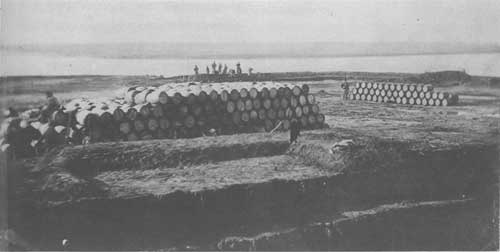
|
CAPTURED CONFEDERATE SUPPLIES INCLUDED BARRELS OF SALT AND MOLASSES.
(CHICAGO HISTORICAL SOCIETY)
|
The only hope Johnston gave Pemberton was a plan to assault part of
the Federal line, while Pemberton's army tried to break out
simultaneously. But the plan never came to fruition, largely because
Johnston really had no interest in it, partially because of the
irregular correspondence between the two generals. Couriers had a
difficult time getting through Union lines; some messages never did
reach their destination.
U. S. Grant knew of Johnston's presence and kept a wary eye on
Jackson. Grant dispatched troops to watch the Big Black and warn of any
approach by the Confederates from the east. Union expeditions in other
areas of Mississippi gave Johnston more to think about. Meanwhile, Union
reinforcements began arriving, and by the time the siege ended Grant's
army outnumbered Pemberton's by almost four to one.
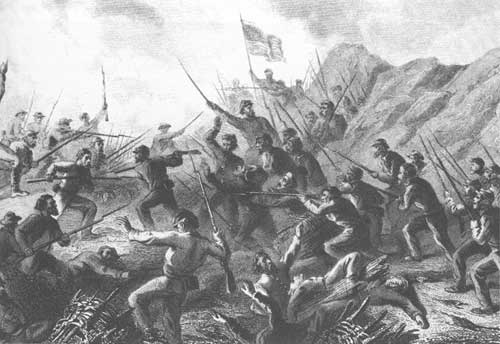
|
UNION SOLDIERS STORM THE CONFEDERATE LINE AFTER AN EXPLOSION OPENED IT
ON JUNE 25. (LC)
|
Inside Vicksburg, citizens who had chosen to remain and Confederate
soldiers defending the city coped as best they could. Along with
Grant's artillery, positioned in a semicircle connecting the northern,
eastern, and southern flanks of Vicksburg, David Porter's Union gunboats
almost continuously lobbed shells into the city from the river. When the
shells came screaming overhead, people scattered, breathing a sigh of
relief if the missiles went on past, for fragments usually fell forward.
Sometimes the results were tragic as private homes and civilians fell
victim to the deadly Union fire.
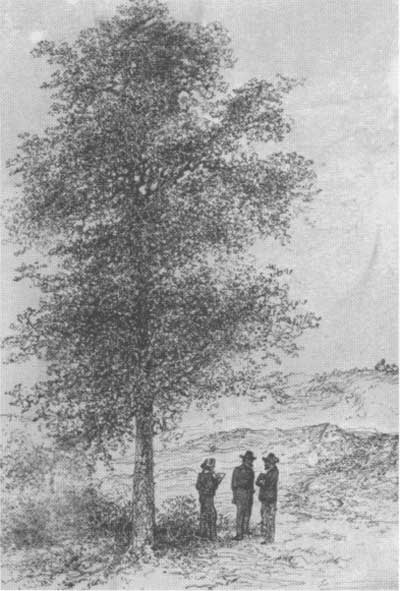
|
A THEODORE DAVIS SKETCH OF GRANT AND PEMBERTON DISCUSSING TERMS.
(AMERICAN HERITAGE PICTURE COLLECTION)
|
Certain days would live on in the memory of the besieged, such as May
29, when the shelling "seriously damaged many buildings, killing and
wounding a large number of soldiers and citizens." Homes used as
hospitals occasionally got hit, doing more damage to sick and wounded
patients inside.
Many residents cut caves into the hillsides and took up residence
there for the duration of the siege. During lulls in the artillery
barrage, people emerged from the caves and cellars and carried on lives
seemingly as if nothing were wrong. But at the first sound of gunfire,
they went scurrying for cover, and Vicksburg once more resembled a ghost
town.
Vicksburg women wrote a special chapter of courage in the history of
the siege. They carried on as wives, mothers, and nurses in spite of the
terror. Some, like Mary Loughborough and Emma Balfour, kept priceless
diaries that contain vivid accounts of life in their war-torn town.
As time dragged on, Pemberton continually cut rations, trying to
stretch his supplies as long as possible. Mule meat became normal fare.
Pemberton later recalled, "I am gratified to say it was found by
officers and men not only nutritious, but very palatable, and [in]
every way preferable to poor beef." Stories persisted that hungry
Confederates resorted to eating rats, though siege authorities have
found no credible supporting evidence. Louisiana troops did eat
muskrats as they had done before the siege.
Grant's army kept up the pressure on Pemberton, ever extending his
lines and tightening the noose around Vicksburg to keep the Confederates
from getting supplies of food or ordnance. Union soldiers conducted
classic siege operations, digging various approach trenches toward
Confederate lines, forcing Rebels to stay on the alert. Yankees hid
behind sap rollers (a roller was a cylindrical contraption stuffed with
cotton or other protective material) as they zigzagged trenches ever
closer to enemy works.
Grant also ordered mining operations. On June 25 and July 1, his engineers
exploded mines, severely damaging the 3rd Louisiana Redan on the
Jackson road and causing numerous casualties among the Confederates in
that sector. In the words of a Louisianan, "It seemed as if all hell
had suddenly yawned . . . and vomited forth its sulphurous fire and
smoke upon them." "From this time forward," Pemberton later wrote, "our
engineers were kept constantly and busily engaged in countermining
against the enemy, who was at work day and night mining on different
portions of the line."
The most spectacular Rebel raid resulted in the burning of the
Federal ironclad Cincinnati, which had been crippled by Confederate
artillery.
|
Confederates conducted sorties of their own to counterattack Union
activities. The most spectacular Rebel raid resulted in the burning of
the Federal ironclad Cincinnati, which had been crippled by
Confederate artillery. The boat was later salvaged and put back in
service, but the incident boosted morale, and Pemberton presented the
raiders "with the flag captured on the occasion."
As the month of July approached, Pemberton decided that he had done
all he could do to save Vicksburg. He saw no chance of help from
Johnston or the Trans-Mississippi, and he may have been depressed by a
bit of possible Union psychological warfare. Pemberton received a
letter signed "Many Soldiers," supposedly written by Confederate
soldiers who suggested surrender so they would not have to desert.
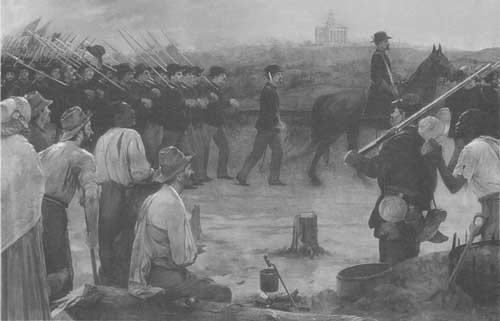
|
F. D. MILLET'S PAINTING OF THE 4TH MINNESOTA MARCHING INTO VICKSBURG ON
JULY 4, 1863. (MINNESOTA HISTORICAL SOCIETY)
|
On July 4, Federal soldiers marched into Vicksburg, and Confederate
soldiers, many angry and with tears in their eyes, stacked their arms.
The long Vicksburg campaign had ended.
|
Pemberton polled his generals as to whether a breakout was possible.
They unanimously said no; Bowen and Smith recommended capitulation. On
July 3, Pemberton opened surrender negotiations with Grant. Grant
demanded unconditional surrender, the terms that had gained him fame at
Fort Donelson. Pemberton refused and demanded terms. He warned his
adversary that unless he was willing to compromise, "you will bury many
more of your men before you will enter Vicksburg." With the help of
Bowen, who had known Grant before the war, and other generals, terms
were finally reached. The Confederate soldiers must give up their arms,
but they would be paroled (allowed to go free if they promised not to
fight until exchanged on a one-to-one basis with Federal prisoners) and
allowed to leave the city. Officers could retain their side arms,
clothing, and one horse each. On July 4, Federal soldiers marched into
Vicksburg, and Confederate soldiers, many angry and with tears in their
eyes, stacked their arms. The long Vicksburg campaign had ended.
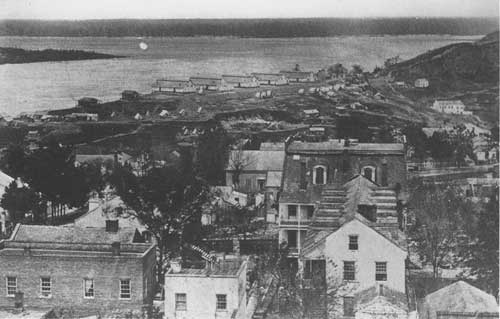
|
A VIEW OF THE CITY DURING WARTIME. (LC)
|
John Pemberton never escaped the shadow of Vicksburg. Accused of
being a traitor for surrendering on July 4, he claimed he did so to get
better terms. In the aftermath of surrender, Pemberton and Johnston
pointed accusing fingers at each other; Pemberton demanded but never got
a court of inquiry. Vicksburg was his last major command; in 1864 he
accepted a reduction in rank and served out the remainder of the war
quietly in the eastern theater. Johnston assumed command of the Army of
Tennessee in 1864, was fired by President Davis during the Atlanta
campaign, and then brought back to lead the same army during the closing
months of the war in North Carolina. The one true Confederate hero of
the Vicksburg campaign, John Bowen, died of dysentery shortly after the
siege.
|
WALLPAPER AND GRANT'S DINNER
Due to a shortage of paper in Louisiana and Mississippi some 31 known
editions of newspapers were printed on the back side of wallpaper. Six
siege editions of the Vicksburg Daily Citizen have been
identified: June 16, 18, 20, 27, 30, and July 2, 1863.
On July 4, victorious Union soldiers reprinted the July 2 edition
with an addendum. They had found that editor J. W. Swords had written
about Grant's boast that he would have dinner in Vicksburg on July 4,
"Ulysses must get into the city before he dines in it. The way to cook a
rabbit is first to catch it'."
The soldiers inserted the following paragraph:
"Two days bring about great changes. The banner of the Union floats
over Vicksburg. Gen. Grant has caught the rabbit,' he has dined in
Vicksburg, and he did bring his dinner with him. The Citizen
lives to see it. For the last time it appears on Wallpaper.' No more
will it eulogize the luxury of mule-meat and fricasseed kitten—urge
Southern warriors to such diet nevermore. This is the last wallpaper
edition, and is, excepting this note, from the types as we found
them."
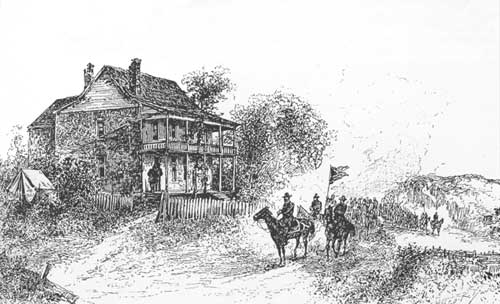
|
GENERAL GRANT AND GENERAL PEMBERTON MEET AT THE ROCK HOUSE IN VICKSBURG
ON JULY 4, 1863. (BL)
|
|
U. S. Grant's victorious campaign made him a national hero. Ahead lay
victory at Chattanooga and then command of all Union forces and
triumph over Robert E. Lee in Virginia. Beyond the war loomed the
presidency of the United States, though a series of scandals would
tarnish his image. The emotional Cump Sherman trumpeted the end of the
successful campaign as a "day of Jubilee." Fame awaited Sherman in his
Georgia campaign of 1864, the capture of Atlanta, his famous "march to
the sea," and final triumph in North Carolina. After the war he would
succeed his friend Grant as general of United States armies.
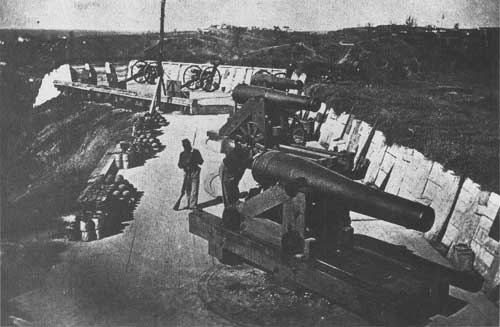
|
THESE UNION GUNS GUARDING VICKSBURG'S REAR WOULD NEVER HAVE TO FIRE.
(LC)
|
So the Vicksburg campaign passed into history, unsurpassed during the
Civil War for its decisive and far-reaching results. The Confederacy had
lost an army, and the Trans-Mississippi Confederacy had been severed
from its sister states, creating insurmountable logistical and strategic
problems. The Union had gained momentum for ultimate victory in the
western theater of the war. Now Federal forces could concentrate on the
one remaining Confederate army in the west, the Army of Tennessee.
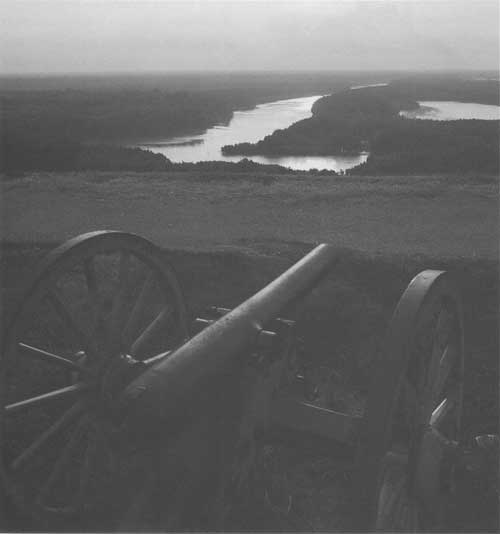
|
A SILENT CANNON AT VICKSBURG NATIONAL MILITARY PARK OVERLOOKS THE
MISSISSIPPI (NPS)
|
Psychological factors were also significant. Coming the day after
Robert E. Lee had been defeated at Gettysburg, the early days of July
1863 had a tremendous impact on morale, North and South. Southerners
wondered if their dream of independence had received mortal blows.
Northerners had renewed hope of a reunited country. Symbolic of their
euphoria was the great river, the backbone of the nation, the father of
waters, the Mississippi, which, as Abraham Lincoln said in simple
eloquence, again rolled "unvexed to the sea."

(click on image for a PDF version)
|
Vicksburg National Military Park
|
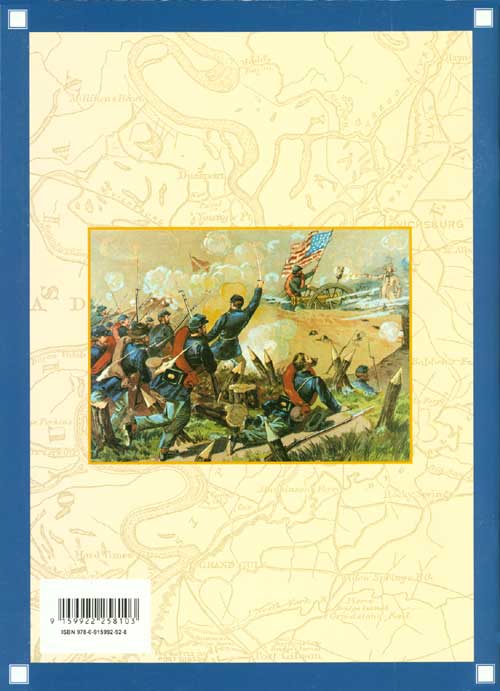
|
Back cover: Siege at Vicksburg, artist unknown. Courtesy Frank
and Marie Wood Print Collection.
|
|
|
